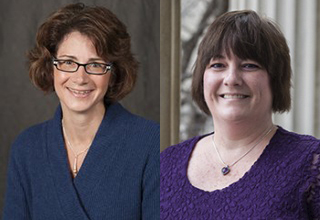
Thanks to funding from the American Political Science Association (APSA)—and the vision and persistence of two Department of Political Science faculty members—female graduate students in international relations from around the country will travel to the University of Iowa campus in 2021 to share their scholarly research, network with their peers, and find support from women mentors in the discipline.
Kelly Kadera, associate professor of political science, and Sara Mitchell, F. Wendell Miller Professor of Political Science, received a $20,000 grant from the APSA's Special Projects Fund supporting the multi-day 2021 "Journeys in World Politics" workshop. Kadera and Mitchell first organized and hosted the workshop in 2004, and the 2021 gathering will be the 13th in the series. The workshop grew out of a 2004 APSA workshop on women's advancement in political science, and has garnered National Science Foundation funding in the past. See participants and programming from the 2018 Journeys in World Politics workshop.
A study conducted by the International Studies Association in 2010 found that only 12.3% of the group's female faculty members had achieved full professorship, while over half of undergraduates in the discipline are women. Compared to the broader field of political science, this study suggested that women were significantly underrepresented in international studies. Kadera and Mitchell's Journeys in World Politics initiative is designed to counter that phenomenon by bringing scholars at different career levels together for mentoring.
Workshop participants include graduate students, assistant professors, and senior scholars. Female faculty and graduate students in the Department of Political Science also participate as mentors, presenters, and discussants. During the three-day event, junior scholars present their political science research and receive feedback, and senior scholars speak about their personal experiences as women in academia. Sessions cover topics such as networking, self-promotion, work-life balance, gender in the classroom, and salary negotiations.
“The female-dominated environment in this workshop produces very different dynamics than we normally experience at academic conferences,” Mitchell said. “The participants are very positive and confident and discuss each other’s work in very constructive and encouraging tones, and they report very positively on the feedback they receive in the research presentations.” Assessments of the program show that Journeys alumnae are very successful in publishing research, getting grants, and being promoted in academia, helping to address the leaky pipeline for women scholars in international relations.
With the funds from the APSA, Kadera and Mitchell will be able to defray the travel, lodging, meals, and transportation costs of the 16 attending PhD students. The funds will also cover a reception where UI faculty and students who are not participants in the conference can network and interact with Journeys participants.
—by Grace Culbertson
Kelly Kadera joined the University of Iowa faculty in 2003. She has a secondary appointment in UI International Programs, where she serves as Director of Academic Programs and works with the Fulbright U.S. Student Program at the UI.
Sara Mitchell joined the faculty in 2004. In 2011, the College of Liberal Arts and Sciences named her a Collegiate Scholar in recognition of her excellence in research, teaching, and service, and she has held the F. Wendell Miller Professorship since 2017. She is a senior research fellow at the UI Public Policy Center.